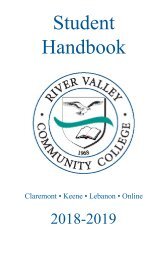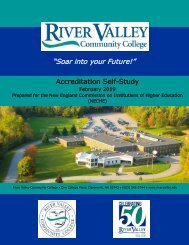Create successful ePaper yourself
Turn your PDF publications into a flip-book with our unique Google optimized e-Paper software.
Student Readiness for College<br />
The Student Success Center (SSC) has many services for students who may require<br />
additional support. Students are provided with information about these services at New<br />
Student Orientation. Services provided in the SSC include disability services, tutoring<br />
services, and workshops such as resume writing, study skills, test taking strategies, and<br />
advice on how to prepare for the Accuplacer exam.<br />
<strong>RVCC</strong> uses the Accuplacer Reading and Writing Sections to determine college readiness<br />
and placements for College Composition, some science courses and some other programspecific<br />
college courses.<br />
Traditionally, the mathematics department had also used Accuplacer testing as a method<br />
of evaluation of student readiness for college level math; however, over the past two<br />
years, the math program at <strong>RVCC</strong> has been revamped as described in Standard Two. The<br />
transition from the previously utilized developmental math pathway to a co-requisite<br />
model of mathematics, required an update to the mathematics advising process. The<br />
team worked to develop a standard classification of math readiness based on multiple<br />
measures: SAT scores, previous math courses, and the students’ academic goals. The<br />
team chose to switch from the Accuplacer to SAT scores for the co-requisite project as a<br />
means of eliminating placement barriers. The SAT is part of the state assessment package<br />
at high school; thus, a vast majority of NH high school students take the SAT and it is paid<br />
for by the state. For those students who are non-traditional or do not have SAT scores, the<br />
process utilizes a personal advising session which evaluates previous math courses as well<br />
as the student’s comfort and understanding of necessary math concepts. The use of<br />
multiple measures as a math advising tool came as a recommendation from both the Dana<br />
Center Multiple Pathway Research and Complete College America resources.<br />
Standards related to academic expectations, removal from the College related to academic<br />
standing, and the appeal process are clearly explained in the Student Handbook (pgs. 22-<br />
23). Students are directed to the online Student Handbook at New Student Orientation<br />
each semester.<br />
Student Financial Aid<br />
Approximately 80% of students at <strong>RVCC</strong> qualify for Financial Aid, and all students are<br />
encouraged to fill out the FAFSA as part of the admissions process. The CCSNH Financial<br />
Aid Handbook spells out the process for students to follow and is located on the <strong>RVCC</strong><br />
website. New students are also sent Financial Aid packets that offer step-by-step<br />
instructions. The Financial Aid Office staff is available to assist students in answering<br />
questions and to assist students and families in the FAFSA filing process. The staff will sit<br />
with the student either in the library computer lab or the Student Success Center and help<br />
guide them through the FAFSA application.<br />
The Financial Aid Office is responsible for reviewing a student’s financial aid records,<br />
collecting required documentation and determining financial aid awards. <strong>RVCC</strong> aid is based<br />
on the Standard Federal Methodology Need Analysis. Students must meet all federal<br />
requirements including Satisfactory Academic Progress. The SAP policy is on the <strong>RVCC</strong><br />
website and in the Student Handbook.<br />
63 | P a g e





